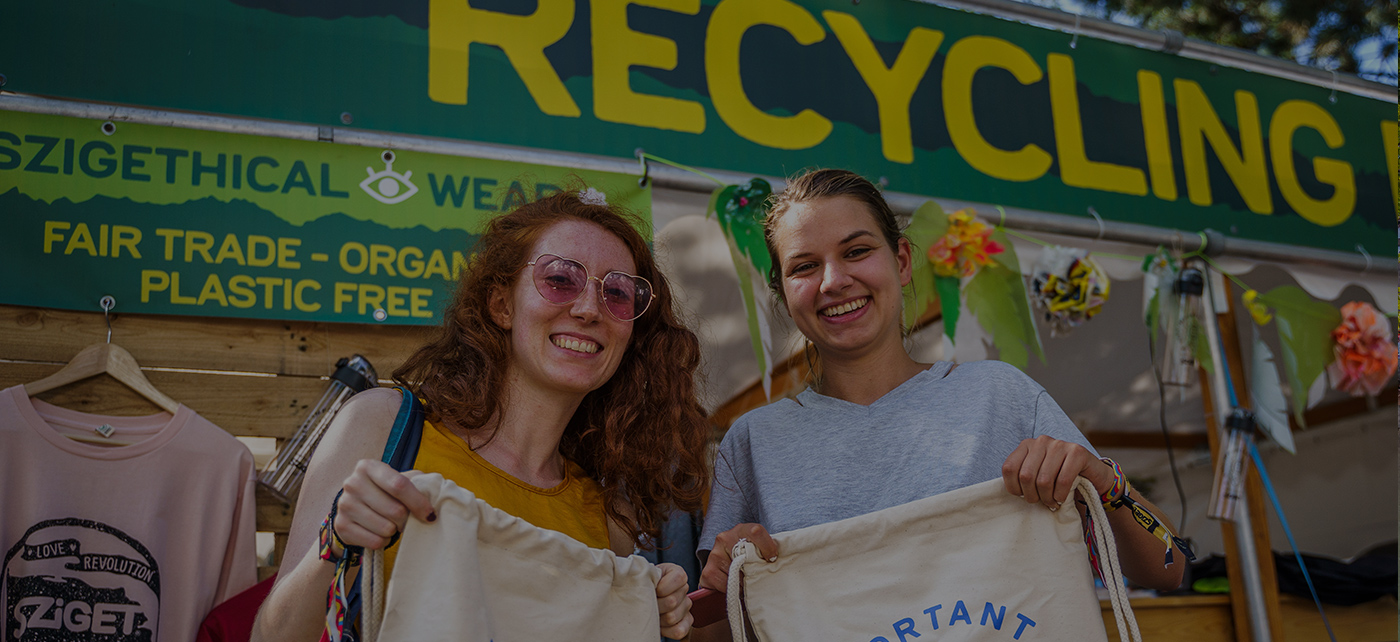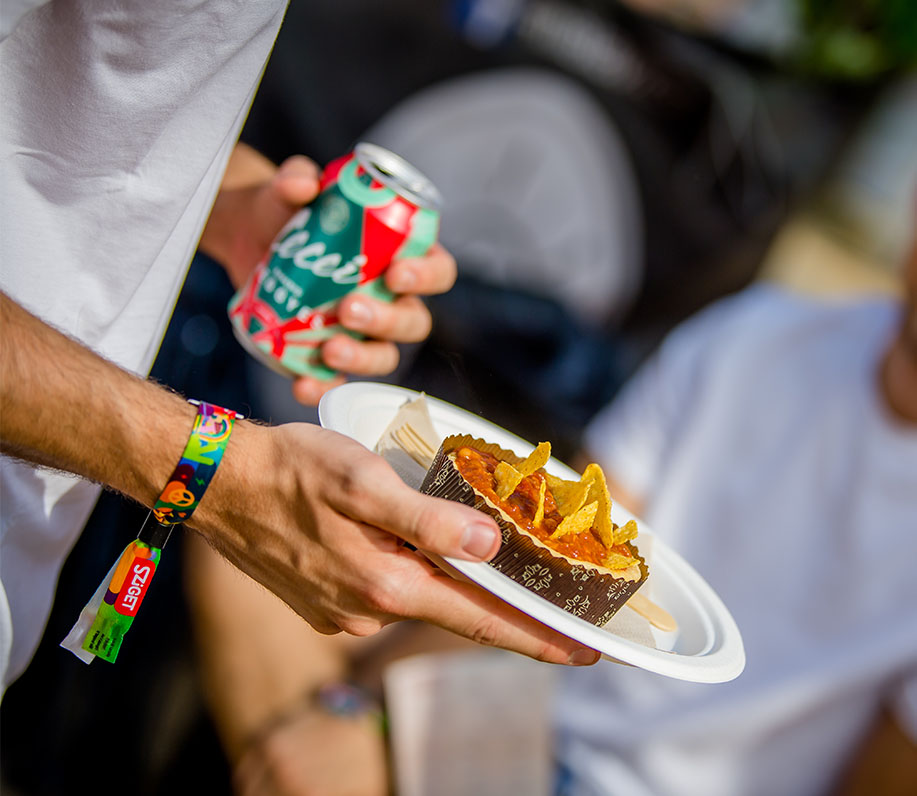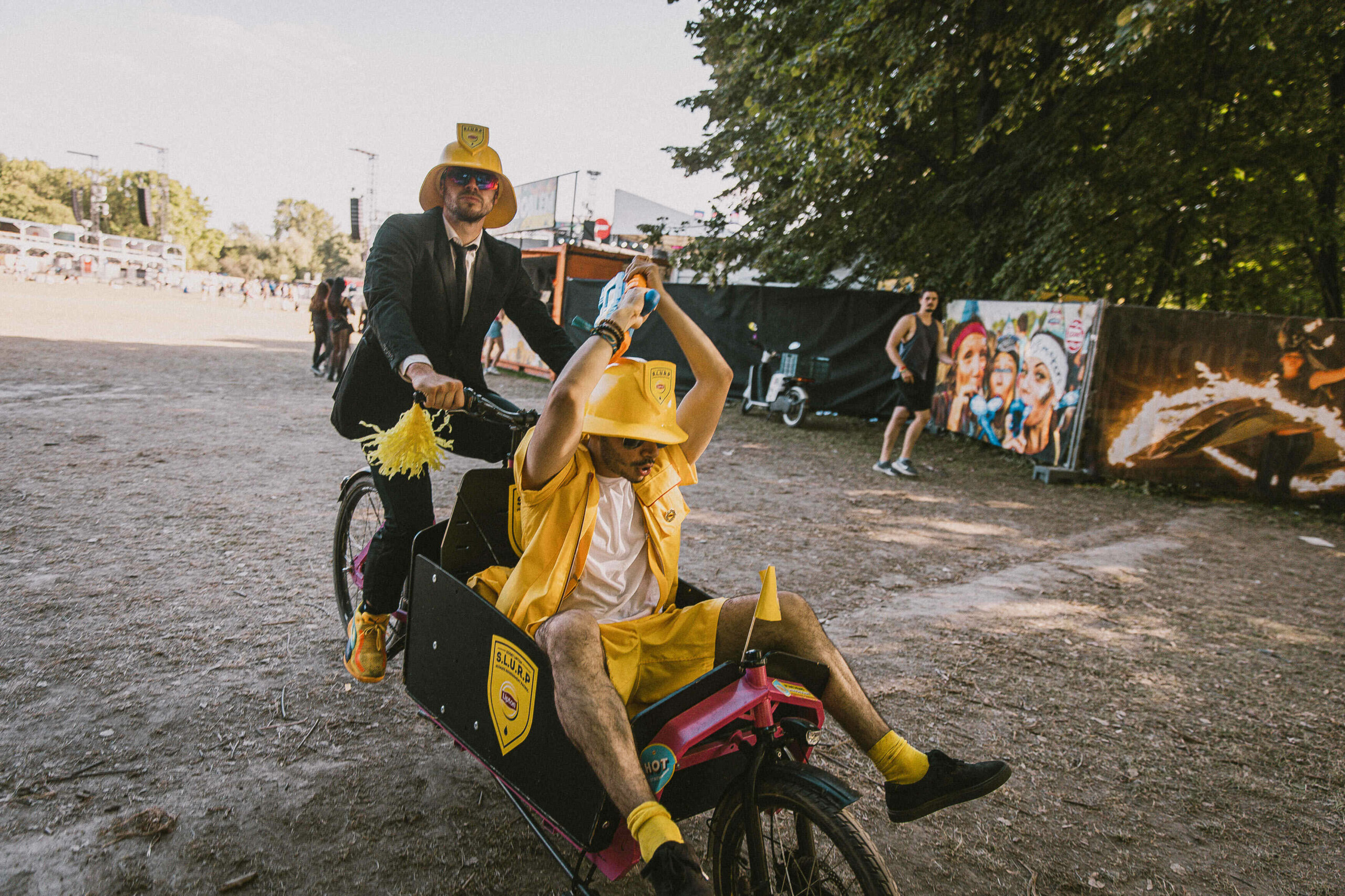
SUSTAINABILITY POLICY
As part of the Green Deal Circular Festivals (GDCF), Sziget is committed to becoming circular and climate-neutral.
The GDCF’s objective is to set an example of good practice by bringing together ambitious players in the festival and event sector; and thereby achieve a cross-sectoral impact in the European green transition. The European Green Deal (2019) aims to make Europe climate-neutral by 2050, with a 55% reduction in EU CO2e emissions by 2030 (compared to 1990).
The role of festivals in the transition:
Legitimizing their place in and on the road to a carbon-neutral world by showing that festivals can also drastically reduce their emissions.
As cultural actors, festivals have a crucial role to play in shaping attitudes. Festivals inspire their visitors, they can define new cultural forms, values and behaviours – which visitors take home with them and make part of their daily lives.
They provide a suitable platform for the introduction and testing of certain sustainable innovations. Festivals are small communities with temporary infrastructures that can serve as models for future sustainable communities.
In this way, they can bring about structural (technology, infrastructure), individual behavioural (habits, choices) and social (norms, collective action) changes that can facilitate a sustainable transition.
Sziget aims to contribute to these objectives at the scope of their whole operations.
This document sets the main long-term objectives, claims the achieved results and plans the immediate actions of 2025 which aim to reduce the negative environmental impact of the festival and maximize positive impact.

Strategy
GDCF Vision:
To integrate sustainability and circularity into everyday operations. Through this policy and other guides, we set short and long-term goals, and communicate current activities and achievements to all stakeholders. Initiatives are monitored through data collection and mandatory reporting, and results are communicated.
Already achieved:
AGF Commended certification 2024
GDCF Monitor
Actions in 2025:
Updating and disseminating sustainability policy
Expanding mandatory data provision, improving data collection
Improving communication of results
Developing a Green Office

Materials
GDCF Vision:
Less raw material input and less waste production. By putting circular thinking into practice, we reduce waste per capita, increase recycling rates and reduce the amount of waste going to landfill.
On the procurement side, purchased products must be made from environmentally friendly materials (preferably recycled), produced under ethical conditions, used for a long time and collected, reused and recycled at the end of their life cycle.
Already achieved:
Green Procurement Guide
30% recycling rate
Expanded composting program, 100 m3 in 2024
Deposit-based hard cup system
Donating tents to charities for reuse + upcycled merch
Actions in 2025:
Integrating the Green Procurement Guide into more purchasing decisions
Purchasing only necessary products and quantities
Prioritizing the use of reusable, recyclable and biodegradable products
Prioritizing natural, recycled, certified and ethically produced products
Further reducing campsite waste through the introduction of a tent deposit scheme
Scaling up the upcycled merch programme
Continue improving the selective waste collection
Minimising printing – careful assessment in each case of whether it’s necessary to print a document
Testing and introducing reusable tableware
Reducing single-use beverage packaging

Food and Beverage
GDCF Vision:
Most meals are plant-based, and the ingredients are certified organic or sourced from regenerative agriculture. All meals are made from local (Hungarian), preferably seasonal ingredients, processed through a short supply chain.
Food waste is minimised through careful planning, no municipal waste is generated in catering, and unavoidable food waste is composted.
Emissions associated with food and beverages are net zero and unavoidable emissions are compensated.
Already achieved:
Introduction and gradual strictening of criteria system for applications with positive incentives
Awareness-raising in collaboration with the Heroes of Responsible Dining
50% of ingredients are local
100 m3 organic waste collected in 2024
Actions in 2025:
Increasing vegetarian/vegan offers, increasing consumption through awareness raising and communication (visitors, staff and artists)
Improving communication
Promoting the use of local, seasonal, organic certified products
Promoting the use of Fair Trade, MSC-certified products
Reducing food waste

Travel and transport
GDCF Vision:
Decarbonization of travel and transport, through planning, optimisation and choosing sustainable alternatives (e.g. biofuels, electric vehicles, micromobility) when available. Including own and suppliers’ transport, staff, artists and visitors. Offsetting unavoidable emissions.
Already achieved:
Helped with ridesharing, high car occupancy (3,7 people)
Cycling campaign
64% of people choose a more sustainable mode of transport in 2024 (on foot, bike, public transport, train, coach)
Restricting the use of on site motorbikes with combustion engines
Green Sziget used cargo bikes and an electric van
Actions in 2025:
Improving communication and awareness raising – focusing on travel packages and promoting more sustainable travel options
Further optimising transport – considering transport options when making purchases – prioritise shorter routes and sustainable options
On-site mobility by cargo bikes or electric vehicles
Research on the possibility of importing and using HVO

Water
GDCF Vision:
Reducing the consumption of potable drinking to a safe minimum. Where drinking water quality is not required, using „renewable” sources, e.g. water from the Danube, and recycled water on-site (grey water systems). Strict protection of the local environment, surface and groundwater from waste and pollution.
Already achieved:
45% of caterers used environmentally friendly cleaning products in 2024
Moving away from chemical toilets
Ensuring free access to drinking water
Effective protection of the Danube from waste and pollution
Dust prevention with water from the Danube
Actions in 2025:
Introducing a water-saving campaign, assessing the possibilities of push-button taps
Further reducing the number of packaged water provided for artists
Seeking collaborations and technologies to develop a greywater system
Expanding the use of environmentally friendly cleaning products























